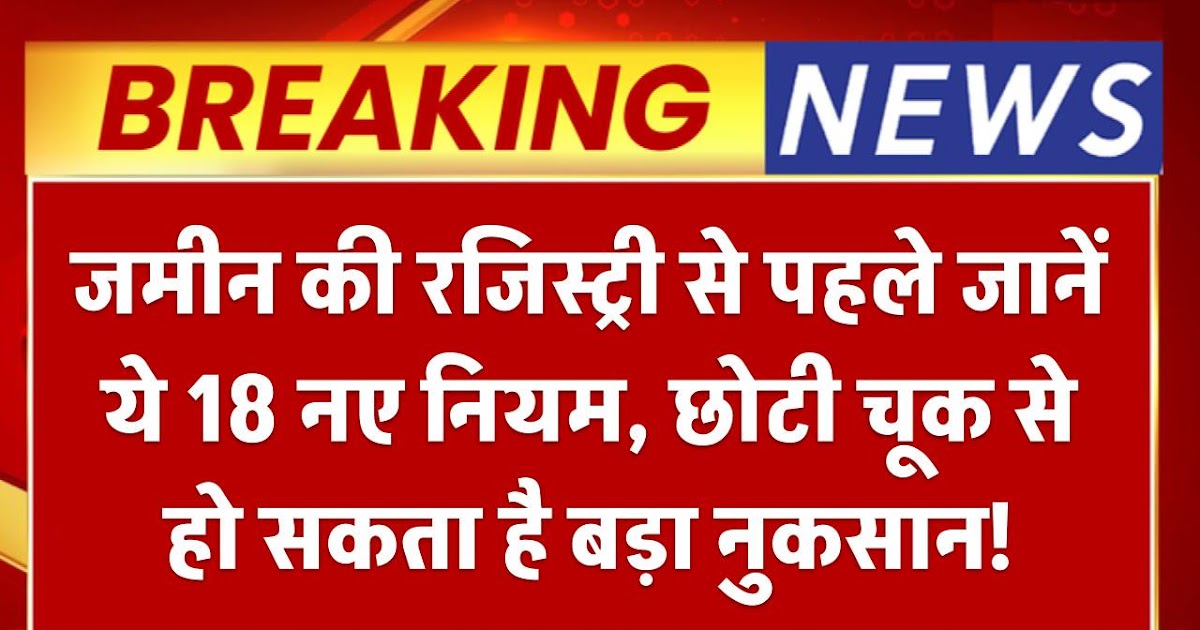Land and property registry in India is an important process that ensures legal ownership of property. Recently the government has made major changes regarding the land registry process.
These new rules will come into effect from January 1, 2025. The main objective of these changes is to make the registry process simple, transparent and secure.
Under the new rules, provisions like digital registration, Aadhaar linking, video recording, online fee payment are included. This will not only make the process faster and easier, but will also prevent fake registries and land disputes. Let us understand all the aspects of these new rules in detail.
The new Land Registry Rules 2025 are a big step towards modernizing and transparent the property registration process in India. This change will not only make the process easier for people, but will also help prevent fraud and disputes. Provisions like digital technology and Aadhaar linking will make this process safer and faster.
Digital Registration: Registry process will be completely online
The land registry process will now become completely digital. With the aim of eliminating paperwork, the government has shifted it to the online platform.
Under this process all the documents will be submitted in digital format. Now there will be no need to go to the registrar’s office and people will be able to register online from their home. Apart from this, the facility of digital signature and digital certificate will also be provided.
Digital registration will not only save time but will also reduce the chances of corruption and human errors.
Aadhaar Linking: A strong step towards security and transparency
In the new rules, it has been made mandatory to link property registration with Aadhar card. Both buyer and seller have to link their Aadhaar cards in the registry process.
Through biometric verification with Aadhaar, it will be ensured that the person doing the registration is who he claims. This step will eliminate the possibility of fake registries and will also make it easier to identify benami properties.
Video Recording: The New Standard of Process Transparency
Video recording has been made mandatory to make the registry process more transparent. Now the entire process will be recorded at the time of registration, which will include the statement of the buyer and the seller.
This video will be kept safe on the government server and will serve as evidence in case of any dispute in future. This will ensure that the registration is done voluntarily and without any pressure.
Online Fee Payment: End of Cash Transactions
Registration fees and stamp duty will now be paid through online mode. The government has ensured the use of digital payment gateways, in which options like credit card, debit card, net banking and UPI will be available.
This step will make the fee payment process fast, transparent and secure. Eliminating the need for cash transactions will help prevent corruption and use of black money.
Unique Land Parcel Identification Number (ULPIN): Every plot will have an identity.
ULPIN or Bhoo-Aadhaar will assign a unique 14-digit alpha-numeric code to each piece of land. This code will contain information about the owner, size and location of the land.
This system will not only simplify real estate transactions but will also help in resolving disputes related to property boundaries. ULPIN will also prove useful in disaster management and monitoring of government schemes.
Electronic Stamping: Security of Documents and Prevention of Counterfeiting
Electronic stamping will now be used in place of traditional stamp paper. This will prevent counterfeiting of stamp paper and ensure correct payment of stamp duty.
Electronic stamping will not only make the process faster and easier but will also increase government revenue.
New registry process: easy and secure
From 2025, the process of land registry will be as follows: Online application
Digital upload of documents
online fee payment
verification of documents
biometric verification
digital signature
Receipt of digital certificate
Required Documents
Under the new process, documents like Aadhar Card, PAN Card, Property Documents, Non-Encumbrance Certificate and Revenue Records will be mandatory. All these documents will have to be scanned and uploaded online.
